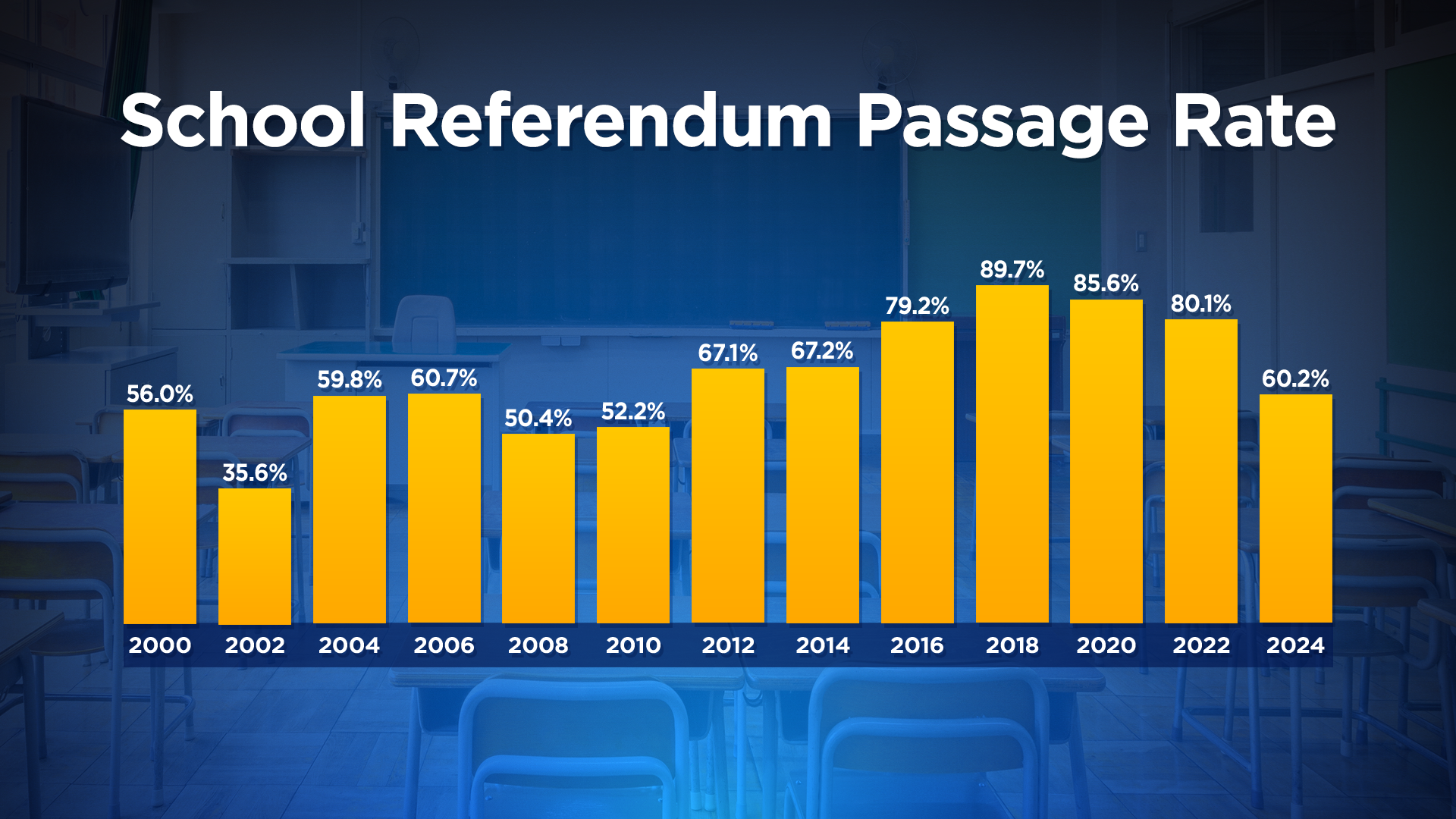Wisconsin on pace to set new school referendum record after 100+ on spring ballots
GREENDALE, Wis. (CBS 58) -- Two years ago, Wisconsin voters saw the most school referendums statewide since at least 2000, and if this year's spring cycle is any indication, 2024 will surpass those 2022 numbers.
An analysis by the nonpartisan Wisconsin Policy Forum found a total of 103 school referendum questions between the February and April ballots this year. That is the most in one spring election cycle since at least 2000.
The most school referendums in one year over that span is 166 in 2022; that year, there were 82 during the spring, so Wisconsin is on pace to set another record if a comparable number of districts go to voters this November.
One of the districts that sought additional help from taxpayers is Greendale Schools. Superintendent Kim Amidzich said the combination of inflation and the expiration of federal pandemic aid left the district facing a substantial budget deficit.
"We saw increased costs around special education because of increasing needs, we saw increased costs in transportation," Amidzich said. "We saw increased costs in operational expenses, such as utilities."
Amidzich said without passage of a $12.5 million referendum this month, the district would've had to eliminate 30 teaching positions.
Greendale voters passed the referendum with 59.2% saying yes. That outcome mirrored the statewide results as 60.2% of the combined February and April school referendums passed.
Going back to 2000, that 60% passage figure is largely in line with outcomes between 2000 and 2010. Then, the passage rates began to increase. In 2018, 2020 and 2022, at least 80% of school referendums passed.
Dan Rossmiller, director of the Wisconsin Association of School Boards (WASB), said he believed voters' own struggles with inflation were a major reason for the decline this spring.
"I think that the impact of inflation is one of the key factors in the way voters are reacting to school district referenda," Rossmiller said.
In Wisconsin, schools get the vast majority of their funding from two sources: general state aid and property taxes. The state uses a complex formula that sets a limit for how much funding each district can receive from those two sources.
The revenue limits took effect in the 1993-94 school year, and annual increases were tied to inflation until 2008-09. Rossmiller said that change under former Democratic Gov. Jim Doyle didn't initially strain districts, but when inflation rates spiked at around 9% in 2022, it pushed school budgets to the brink.
"We ought to go back to the system where revenue limits were adjusted annually to reflect inflation," Rossmiller said.
However, state Sen. Duey Stroebel (R-Cedarburg), a member of the budget-writing Joint Finance Committee, said in an interview last month he didn't think the number of referendums was a sign the state needs to increase school funding.
"Money doesn't fix everything. You know, you just can't throw more money at it and expect your kids to be smarter," Stroebel said. "Sometimes, you have to do things differently or better."
Stroebel pointed to Oostburg as an example of a school district that has done well with relatively little per pupil state aid. The district went to referendum in 2016 and 2020, although those were aimed at funding capital projects as opposed to referendums meant to cover operating costs, such as the one in Greendale and the much-discussed $252 million Milwaukee referendum that narrowly passed.
"We have a lot of very high-performing school districts that don't go to operational referendums," Stroebel said. "And they do one heck of a great job educating their kids."
This spring, 66% of the school referendums were operational, the largest share since 2000.
Rossmiller said numerous factors help determine whether students are likely to do well in the classroom, regardless of whether state revenue limits for that district are comparatively high or low.
"I think if you give me a population of students and tell me about their income levels and their parents' level of education, I will be able to reasonably accurately predict how successful those students will be," he said.
Amidzich said had Greendale's referendum failed, music and language programs would've been among those either reduced or eliminated. Given the district's increase in costs related to special education, Amidzich said Greendale felt even more of a pinch from the state only covering 31% of a district's special ed spending.
"We need a predictable formula, where that revenue limit increases by the rate of inflation," she said. "So that we can continue to sustain the programming that we offer for students."
"When you have that number of referendums, it speaks to a larger, systemic problem."















